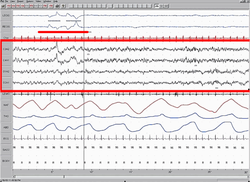
From extensive sleep studies we know that dreaming occurs during REM sleep, (Rapid Eye Movement). Inset photo shows EEG traces of the rapid eye movement. This is the period of high brain activity in the alpha state. Dreaming can occur in slower states but is usually less vivid and are more difficult to remember. We all have between two and eight dreams each night and they can last for just seconds, or for as long as 20 minutes. We are more likely to remember them if we are awakened during or after the dream has recently ended. At times, dreams can provide an inspired thought, or some insight, but the questions about dream interpretation are greater than the answers.
From the academic perspective, Freud speculated that dreams are wish fulfillment and related to unconscious thought. Jung rejected this view and believed that dreams are unconscious desires and that they demanded the dreamers attention as they were messages from deep inside the psyche. But, many researchers since then have postulated many varied ideas, but the ideas have become the property of popular psychology and they have reduced the complex biochemistry of dreaming to "simple dream interpretation". So, for example, I looked up the meaning of dreaming of water. It had two paragraphs of "water is the life force of the mind" and the flow of life can be serene of turbulent. If it is boiling water, the it means that we are in turmoil. As a healthy skeptic, I reject the notion that all dreams are equal and that we all perceive everything in the same way. What I offer is an observation and should not be considered scientific in any way.
The first thought that I offer is that the brain is active during sleep. That is a fact and the brain waves are either alpha, beta, theta or delta. This is high to low activity and there is no surprise that our memory is tapped into during sleep. But I also believe that dreams are sometime just electrical activity and have no significance at all as the dream becomes active. But, there is some connection to what we experience and how it is remembered as we dream. So, I have recorded my dreams over long periods of time and have had very little success in finding correlations between the dream world and the real world. That is not to say that there isn't some correlation, but that I just have not seen it. I have even had a sleep study done and that too was not very informative.
I think that the bottom line is that dreams are like fingerprints: they are all different and unique to the dreamer. The only way to see connections is to look for them. Checking a dream interpretation book for the explanation is a waste of time and precious resources. Now, if I dream of smelling a rose, am I looking for romance, or just trying to figure out how to extract the fragrance? Just a thought...

 RSS Feed
RSS Feed
